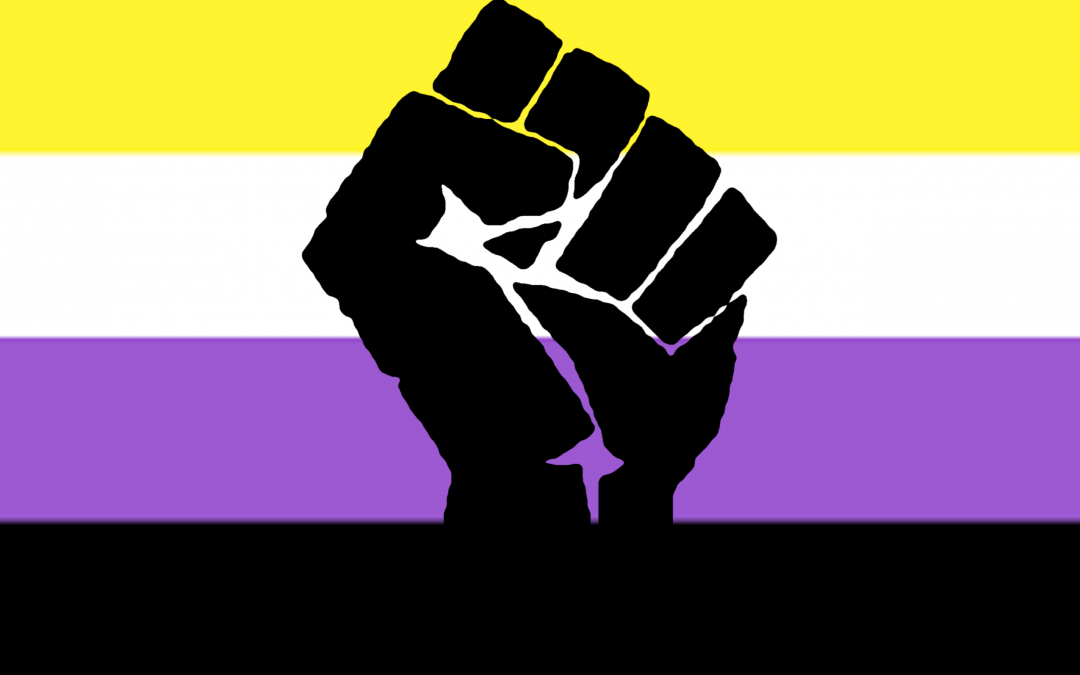Long ago, before the greater patriarchal regime and its correlated ciscentric literary sphere were erected, humanity existed in relative harmony… but that all changed when the gender binary attacked.
Gender—in its entirety, in it’s full spectrum—is especially hard to understand when representation of gender variance is such a rare occurrence in the lit-o-sphere. There’s a reason that textbooks are a staple of academia. You’ve heard the chants from the woke millennials.
Representation matters.
While characters who don’t fit within the gender binary never completely disappeared from the lit world, they have been historically few and far between. It was (and continues to be in many spaces) taboo, and therefore talked around rather than explicitly stated or explored.
Until recently.
With social justice in all its forms on the forefront of the collective global consciousness and conversation, there’s been a greater focus on diverse representation. In the iconic words of Bowie, the lit-o-sphere is undergoing some ch-ch-ch-changes and it’s about time we turn and face the strange*.
*it’s part of the lyric, not some subtle derogatory commentary. If nonbinary identities are strange, you should take a cold hard look at the dystopia that is The Gender Binary.
[cracks knuckles] Let’s begin.
1. CRUZ ROJAS from Michael Grant’s Gone series
According to the wiki for the Gone series fandom, Cruz identifies as a female. However I contest that she fits in the binary just because she uses female pronouns. Your honor, I call Monster, the book in which she debuts, to the stand.
On page 28, Cruz describes her gender as “e) all the above, trapped in a True/False quiz”, which is an especially apt analogy. The way it makes labeling your gender seem like some sort of test is all too relatable for those of us who’ve felt boxed in by the binary.
Cruz’s power in the novel is a sort of invisibility/camouflage which has interesting implications in conjunction to her gender identity. Perhaps a commentary on the ways in which non-binary identities have historically been largely invisible in the media/literary sphere. Perhaps a commentary on the occasional necessity of camouflage to ensure one’s safety when one doesn’t conform to (cis)gender norms.
Of course, Cruz’s power (and her company) would be integral in my crime fighting squad.
2. ALEX FIERRO from Rick Riordan’s Gods of Asgard series
Alex Fierro—child of Loki, pottery enthusiast, light of my life.
Alex identifies as genderfluid which is represented gracefully within Riordan’s novels. Alex’s gender shifts as do the pronouns used to talk about the Norse demigod. Sometimes Alex is a daughter of Loki. Sometimes Alex is a son of Loki.
Like Cruz, Alex also has a power. He can shapeshift. Like Cruz, Alex’s power also has interesting implications. Perhaps a commentary on genderfluidity as it relates to shifting senses of self. Perhaps a commentary on our shifting perceptions of people based on how they identify.
What I find interesting is that, when Alex shifts from identifying as male to identifying as female (or vice versa), he doesn’t change his outward appearance. Just her pronoun.
Although the main character, who’s totally (and canonically) crushing on her, seems to pick up some visual changes—he alludes to the fact that the shift is in his perception more than it is in Alex’s actual physical appearance. I dig this because it shows that the physical isn’t inherently an indication of gender as well as a depiction of how one can respectfully perceive and interact with someone outside of the gender binary.
In my crime fighting squad, Alex’s friendship and her shapeshiftery would be revolutionary.
3. SORO FLYNN from V. E. Schwab’s Monsters of Verity series
To be completely honest with you, dear reader, I haven’t yet read Our Savage Song or Our Dark Duet. So I can’t give you specifics on why Soro would make the best comrade in my crime fighting soiree. This being said, I can vouch for V. E. Schwab.
Soro is different from the aforementioned nonbinary characters in that they go by they/them pronouns. When a fan expressed their confusion and dislike surrounding the grammatically sound use of a singular they, Schwab responded in a way that made my queer heart sing.
Schwab addressed this, via twitter, “Soro is non-binary, hence the use of THEY. I’m sorry that it distracted you, but respecting identity is important. Please try harder.”
The majority of V. E. Schwabs books, according to the author, have been a reaction to something she’s read or haven’t been able to find. AKA: She’s all about that representation.
Schwab’s resume of representation in her personal lit-o-sphere is immaculate, her characters are fierce, and I cannot wait to meet Soro in Our Dark Duet (I’ve already purchased both a print and digital copy).
So, there you go!
My crime fighting, non-gender conforming, literary dream-squad.
We’d be a small, but capable group—and we’d always be looking for more members. Who do you think should join the squad? What powers do you think would complement our nonbinary identities? Comment below!
Meet the blogger:
 TIJQUA DAIKER lives in Minnesota.
TIJQUA DAIKER lives in Minnesota.


